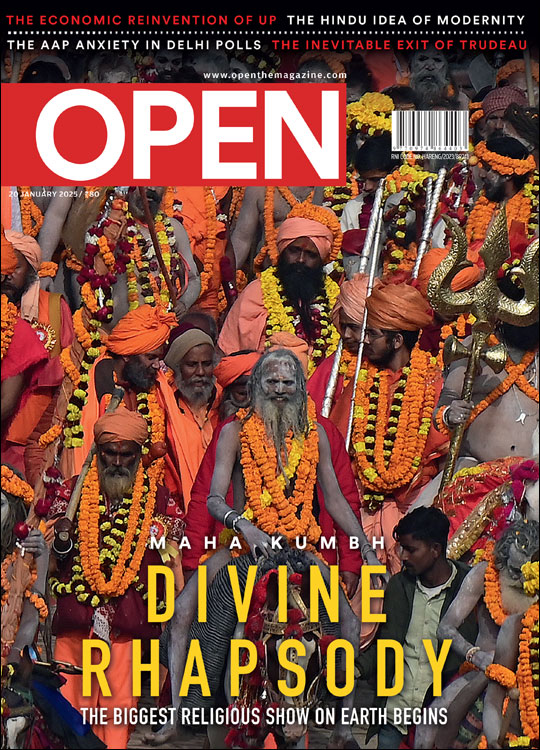In One’s Own Company
Conversations with lonely people
 Chinki Sinha
Chinki Sinha
 Chinki Sinha
|
12 Jan, 2015
Chinki Sinha
|
12 Jan, 2015
/wp-content/uploads/2015/11/17418.loneliness-final.jpg)
Conversations with lonely people
‘Always, everywhere, there is some voice crying from a tower’ ― Graham Greene
In a green room, my grandfather’s room in Arah, Bihar, where he spent his last days drinking whisky from a bottle wrapped in brown paper, his head on his desk, a lamp casting strange shadows on walls with thick green paint peeling off, is where loneliness first began to feel like an intruder, and then part of everyday life. Years later, there is this photo of yet another room with green walls. It has a young man trying to cope with what seems like an eternal condition of the mind.
We exchange notes, and photos, and histories. Green, then, is the colour of loneliness, we agree. That is if we can colour code it. Night is its time. Mostly.
‘The peeling dark green paint [is reminiscent] of an entrepreneurial venture a long time back. Young dreamy eyes just returned from Germany envisioned LALJANG PAINTS COMPANY and the first year brought a profit. Had it been in existence, it would have given tough competition to a popular brand of TATA …’ a cousin once captioned a photograph taken on our last visit to the ancestral house. A piece of soap, and jars that once contained jaggery, and other such forgettable things. Lonely, and eternal. Symbols, and leftovers. The house was never repainted.
Green walls formed the backdrop of my first tryst with loneliness. Of a man who wrote entries in his diaries until he could see no more. He could read no more, and he was waiting to die in a lonely town in a crumbling house. He died one night in his four-poster bed. Quietly. There is an entry in one of his diaries about doors shutting and opening, and the sound of loneliness. Nothing ever changes, he wrote.
But there is the loneliness of the young and urban, too. There is loneliness of all kinds. Of heartache, of abandonment, of situations we create in our heads.
Of all the ailments that are decipherable and curable, a cure for loneliness is perhaps the most elusive. The first obstacle is to admit it. This requires us to define it. Which could mean collapsing one’s self-image, maybe even making some tough confessions.
Medical science has started to recognise it as a life threatening condition. Lonely people, research finds, die sooner. There are many theories. Because they have no companion, they lack reminders for medicines, for checkups, or for other things. It is like they are losing a battle. Often, they are at war with everything that society venerates; they haven’t learned to be in the company of others, and others are either helpless or don’t care enough to do something about it.
Arindam Banerjee’s room in this forgotten Bengal town is painted green. The windows look out on a courtyard where his landlady comes every morning and they talk about this and that. The first few months were tough. He, who is only 27, had moved here from Mumbai, and at first, he didn’t quite realise how loneliness seeps in. Perhaps it becomes part of you, he says.
Over the phone, he is eager to explain the loneliness of a young man who can’t help but let it take over. At first, he defined it as solitude. But then, that meant one had the choice of discarding it, going out to meet people, drinking and dancing, or singing, or whatever else everybody does. He had met a girl in a programme he attended—part of the Prime Minister’s Rural Development Fellowships. He thought they could be together. But then they went to different mofussil towns. If he was lonely, so was she. He thought they could talk about it. But loneliness knows no friends or paramours. It is both individual and universal at the same time.
Expectations, and then the hours Banerjee spent waiting for conversations with her, all wore him down, and eventually, he began to adjust to a life of lull. He is young, and has been to places like Berlin. And sometimes, he says, all this travel also makes a person lonely. Because you have seen things, lives, and places, and you have crossed over in some sense.
“There is a constant dichotomy of being in the real and the unreal,” says Banerjee, “Real would be the things that I get to do. Like meet a girl from a jungle, a tribal. That girl speaks about daffodils in a poem. And it is so surreal. People in metros talk about another reality. These are people who are not relating to what I say. Then you become a lonely person. Solitude is about personal experience.”
Loneliness, he says, becomes a way of life: “Initially, it was hard. The idea of loneliness was hard. I like the choice. It is not about finding someone. There is this idea. I meet people off and on. After a point, you realise the conversation can go on [only in person]. It can’t go on via mobile phones. It is futile. It can’t start on a distant note. It can’t start with distance.”
Recently, when he was in Ghaziabad, he felt awkward. In Kolkata, from where he picked up an old gramophone player, he eavesdropped on conversations in the metro, and he felt outdated. In either case, he felt he wasn’t part of what he had left behind. Sometimes, returning is difficult. That’s what loneliness does to you, he says. “Makes you lonely in a room full of people… because you have known it. You know it is there in you.”
In trying to grapple with it, he thought it was because of the absence of another person. Then, there were other things he figured about himself. Being a single child, for example, or being ambitious and going too many places to return to a forgotten place, and a sense of being in a vacuum.
Compressed phone conversations, hopes of companionship, and the reality of a life that makes him read about Agastya Sen in English, August many times over. He finds himself looking for that fictional town where time is only a matter of routine. Upamanyu Chatterjee’s novel English, August was first published in India in 1988 and tells the story of a young civil servant posted to a fictional rural town called Madna. There is this aimlessness in his life. There are no grand ideas. Almost like Fernando Pessoa, the Portuguese writer who in his The Book of Disquiet writes about solitude and isolation and living in a small town. “Solitude devastates me; company oppresses me,” he says.
Banerjee returns to the book often. On the shelf, there are books that he orders from Flipkart, and in the evenings, he sits by the window going through this stack of literature on nostalgia, and solitude. That is how he enters other worlds: a way of coping with loneliness, which seems to descend upon the town. That’s what he says, and sees. He is a young man in exile.
“Loneliness finds more loneliness, finds its own company in others. My landlady’s children are no longer here. One lives in an alien country, the other in a different city. They must be my age. We chat sometimes, and sometimes when I get home late, she sends me a dish wondering I have eaten at all. She must be lonely,” he says.
He knows he isn’t here forever. Maybe more lonely towns wait for him, he says.
‘There wasn’t a single thought in his head about which he didn’t feel confused,’ writes Upamanyu Chatterjee of the protagonist in English, August, and perhaps this is what he feels here.
Maybe he will venture into yet another lonely life. In a mofussil town with no bars to go get a drink all by himself. On the old gramophone he bought in Kolkata, he plays some records that he found. These are old songs and he sits in his room thinking about how odd it is to now go to a city. Midnapore town, where he now lives, is a place where time isn’t of much consequence. It moves sometimes. Other times, it feels like he has been living here forever.
It’s a life that’s making him a different person, someone who can detect loneliness in others just like that. One can tell from the songs they listen to, or the quotes they cite. They usually read similar books, and similar stories.
That’s how I found him. We read similar books. He also takes photographs of loneliness. A tree in the rain shot from a train. Railway tracks. Things that lonely people see. Like a lone bulb hanging from a wire in a storm. This was a picture I clicked on one of my assignments.
He says you can see loneliness. Here, you could see it in the slow hands of the clock, as Bukowski said. Time is a relative thing. A night could be an eternity.
Loneliness can kill, say doctors and experts. Several studies have been published worldwide on urban loneliness and depression, and these are topics discussed in social gatherings where the affliction is decoded, and solutions offered. But is there a solution to it? To a state of isolation that you’re so used to that you start getting tired of company?
Ideas still fascinate you, but love assumes other meanings. You love from afar.
In Arindam Banerjee’s case, loneliness was imposed on him, and then became his metaphor for life. There is another way of looking at it, he says. It makes you free. There is no reason for this, as with most things in life, he says.
But there are also those that think they were born lonely.
All the apartments he has lived in were perched high so the view was either the sea or the hills. In Mumbai, he moved further away from the crowd. He kept moving until he came to Vashi, where again, the windows look out on the sea. The sea here is lonely—with rocks, and an occasional boat.
“Isn’t this beautiful?” he turns around and asks.
There is almost no noise. Dogs bark occasionally. He speaks to them, feeds them biscuits, and knows they wait for him. In fact, they run after his car when he returns home in the evening.
Abhimanyu Kumar is lean, almost boyish. In his thirties, he has a few strands of grey hair, but it makes you look all the more closely. Beyond that dash of grey, ageing has mostly ignored him. Not many have been to his apartment. His bedroom wall has stickers of Mickey Mouse, and Disney characters. There’s an air gun, and there is a La-Z-boy chair next to a window that looks out on the swimming pool. In the darkness, the stickers glow. Something of his childhood days. He would collect stickers, and paste them on books, and tables and walls. That was then. This is now. Does anything change at all? He asks.
An IIT and IIM graduate, Kumar is CEO of Preventine Lifecare Pvt Ltd, a DNA testing company that has offices in Brazil, and Spain, and now also in Austria in a picturesque town. But the question that he often asks himself is what he is going to do with all this money and success. That’s the other side of loneliness. He tried getting married, but the thought of sharing his space with someone was dreadful. He gave up. Sex wasn’t that big a deal. He couldn’t trade his evenings of staring at the sea for nights of passion.
Lonely people and lonely places are everywhere. It is a societal as well as mental condition, they say. Once one has had it, one may even crave it.
“Loneliness doesn’t depend on headcount. You could be with people, and yet be lonely. There are people who claim to be settled with the idea of being lonely. That’s a lie. Even I would like to believe it. I talk to dogs about the country. Like, ‘Do you think about where this country is going?’ They bark and I give them more biscuits. I make peace with the fact that I am alone. I have involuntarily discovered my own company. Lonely people talk to birds, or the lizard on the wall. Or they talk to themselves. Because they couldn’t find another, they settle with themselves,” he says. And then says he’ll try and explain.
Kumar says he wasn’t born this way. It is a natural instinct to seek company. An experiment had robots with simulated emotions; left in the dark, they were found in the same corner of a parking lot where a lonely car stood parked. Open spaces are scary, he says.
“You are so hooked to certain things, you can’t settle for something else. That would be an insult to yourself. It is also an ego thing. It is either zero or one. Once you have realised the intensity of pain, you won’t take that chance again. In young people, they have pressure, peer pressure, and it is easy to get lonely out there. They know the extremes of loneliness. Old people too. They seek God’s company,” he says. “I don’t feel lonely alone at night. I feel lonely in chaotic spaces.”
But then, he also believes that if your mother was lonely, you would inherit some of it. And an inheritance is something that you will carry through, not squander.
“How lonely is your mother? Once, there was a culture of the joint family. That’s gone now. Many things have contributed. Everybody has early memories of arranging books or tying your shoe laces. The day you solve these things, you will become alone,” he says.
For Kumar, being alone, lonely and solitary are overlapping states. It can be seen as a mathematical thing. The thresholds define your strength. “The thresholds I crossed gave me confidence,” he says, “It gave me confidence to live alone. It is a bad thing, I guess. You need people. That’s how society evolves. Nobody is a team in themselves. If you like someone and they don’t like you, you don’t want to like another. They think, ‘I am a strong person.’ But it is a pathetic thing to have happened to you.”
And here he is, a young man who is highly successful, has attended the best of colleges, and has an aquiline nose, deep set eyes, and a lot else. And he is lonely by choice. Or rather, by the fact of his birth, and experience.
“You have everything and you are lonely. Or you have no money and beauty, so you are lonely,” he says. “Some things are in your coding. You can’t free yourself from it. It is like cancer.”
He asks me to listen to a song from the 1980 film Sitara:
Ye saaye hai, ye dunia hai, parchhaaiyyo ki
ye saaye hai, ye dunia hai,
Bhari bheed mein khaali
Bhari bheed mein khaali, tanhaaiyyo ki…
“It reminds one of the voice of a sad urban girl. She is lonely. Like you,” he says to me.
Then there is the loneliness of gender. Of not belonging to the binaries of this concept.
Consider this person’s loneliness.
Almost always, he is plotting an affair. There’s always a possibility of love, and unless you’ve slept with someone, he says, how would you make them fall in love? But love is constricting, he adds. That’s why he is not in love. Not at least with anyone he meets at parties in Delhi.
“I am lonely,” he says. “Lonely in my gender, and in my life.”
There is always someone he has found. But he says he knows it is a condition of the mind. Someone told him he would turn insane after 40.
“You think so?” he asks.
But when you cross that barrier, insanity would not matter. Until then, there’s loneliness to be dealt with. Drinking on weekends, snorting cocaine, and partying late into the night do not help. It is to escape the tyranny of one’s own company. In one’s own room, the mind wanders, hits the wall, and returns with questions, memories, and losses. It feels a lot like going insane.
“You are driving yourself to the point of no return,” he says.
He won’t give his name. To the world, he is gay and happy. But there are nights, many of these, when he escapes the loneliness of his mind and life. He has lovers, and he has parties. But in the end, there is the eternal winter of a lonely life.
And there are others who admit they are lonely. There is me. Despite company, and in spite of everything.
And then, there are lonely places.
Often, I go to such places to explore them, and then decode it all. Brothels, for example, are lonely places full of men, and sex, and the promise of love, and these are in urban spaces. Prostitutes are perhaps the loneliest of all. They die young. Most of them.
But whether we die of loneliness or live with it, it is a condition that has a kind of permanence. There is no escaping it. Once you have adjusted to it, it becomes you, as Arindam Banerjee says.
So you begin to love your own company. Maybe that’s where problems start. Or maybe that’s where freedom begins.

/wp-content/uploads/2025/01/Cover_Kumbh.jpg)













More Columns
What does the launch of a new political party with radical background mean for Punjab? Rahul Pandita
5 Proven Tips To Manage Pre-Diabetes Naturally Dr. Kriti Soni
Keeping Bangladesh at Bay Siddharth Singh